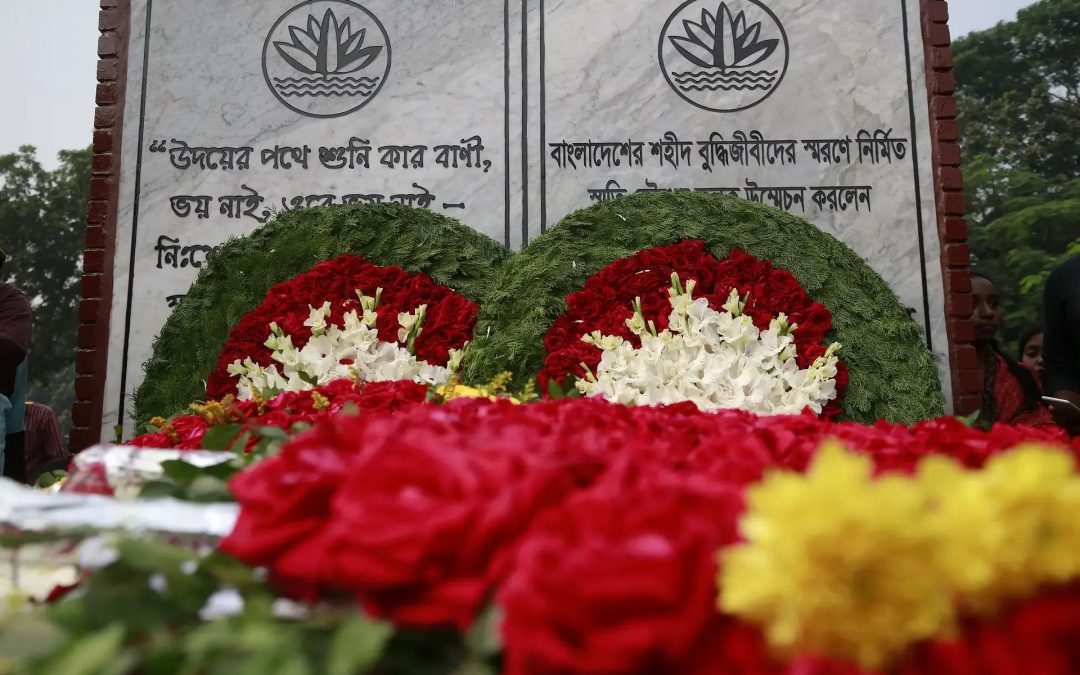People of all backgrounds pay tribute to the nation’s finest minds who gave their lives for their cause with sadness, reverence, and love|Photo: Subhra Kanti Das
In a nation forged through a courageous struggle for liberation, the promise of freedom and democracy should shine brightly.
Yet, as of December 14, 2022, the heart of Bangladesh faces a deep wound—one inflicted by authoritarian control and suppressed liberties.
The voices of its people, the intellect of its scholars, and the very fabric of its democracy are under attack.
It is time for the citizens to unite, speak up, and reclaim the rights they so valiantly fought for.
A Nation’s Freedom Under Siege
The mass solidarity movement gathered at the “Martyr Intellectual Memorial” in Mirpur to honor the sacrifices of Bangladesh’s intellectuals.
In their tribute, the organization’s leaders declared that the current government has tightened its grip on the nation’s people, stifling their fundamental rights.
Leaders like Monir Uddin, a member of the political council, and Bachchu Bhuiyan, a member of the editorial board, have highlighted the crushing of people’s freedom of thought, speech, and democratic expression.
The Digital Security Act, a controversial law, has become a tool to silence dissent, censor opinions, and punish creativity.
Any form of critique, from poetry to cartoons, faces severe consequences.
The leaders reminded everyone that without the removal of this authoritarian regime, there can be no path to restoring democracy and the fundamental rights enshrined in Bangladesh’s Constitution.
The Weight of Responsibility on Intellectuals
Bangladesh’s intellectuals, who were instrumental in shaping the country’s socio-political landscape, are burdened with a dual responsibility: to foster creativity and to safeguard society’s conscience.
However, today’s intellectual community faces an unprecedented challenge.
The state has methodically suppressed their voices, curtailing freedom of thought through oppressive policies and systematic fear.
The leaders underscored the importance of intellectuals spearheading the movement to unite citizens against oppression.
Creativity and free expression are not mere luxuries—they are vital lifelines for a society’s progress.
The suppression of these freedoms threatens to dismantle the principles of the liberation movement that birthed the nation.
Building Unity for a Democratic Future
The restoration of democracy requires a collective effort.
The leaders of the Mass Solidarity Movement stressed the importance of uniting all forces—political, intellectual, and social—to challenge authoritarianism.
They called for a mass movement where the people’s voices could rise together, pushing for the restoration of free voting rights and civil liberties.
The fight ahead is daunting, but history shows that Bangladesh’s strength lies in its people’s resilience and unity.
Silence did not win the liberation war, and it cannot win this battle for democracy either.
Verdict
Bangladesh is at a crossroads, its democratic ideals shadowed by authoritarian rule.
Yet, within this darkness lies a spark—the indomitable spirit of its people.
As the Mass Solidarity Movement leaders pointed out, the power to restore freedom and democracy lies in collective unity and unwavering determination.
The struggle may be long, but it is one worth enduring.
For the soul of Bangladesh, born of sacrifice and courage, must remain free.
Let this be the rallying call for every citizen who dreams of a just, democratic, and prosperous nation.

